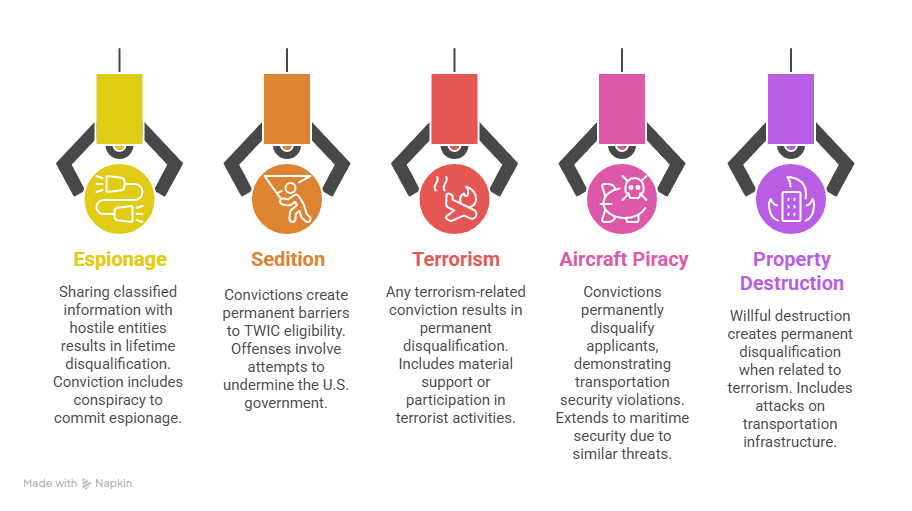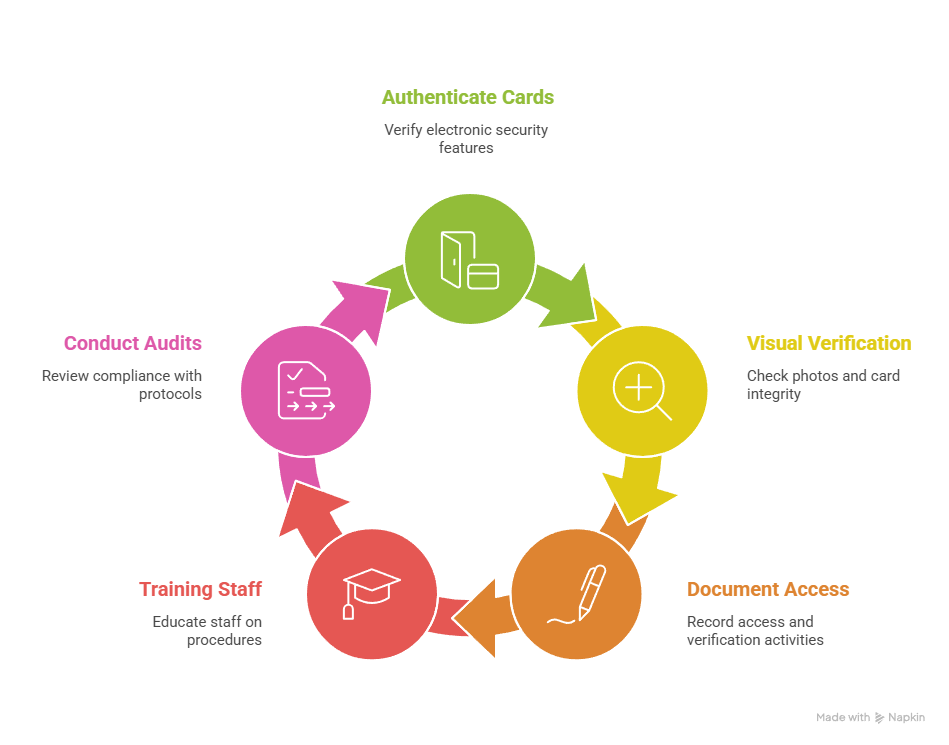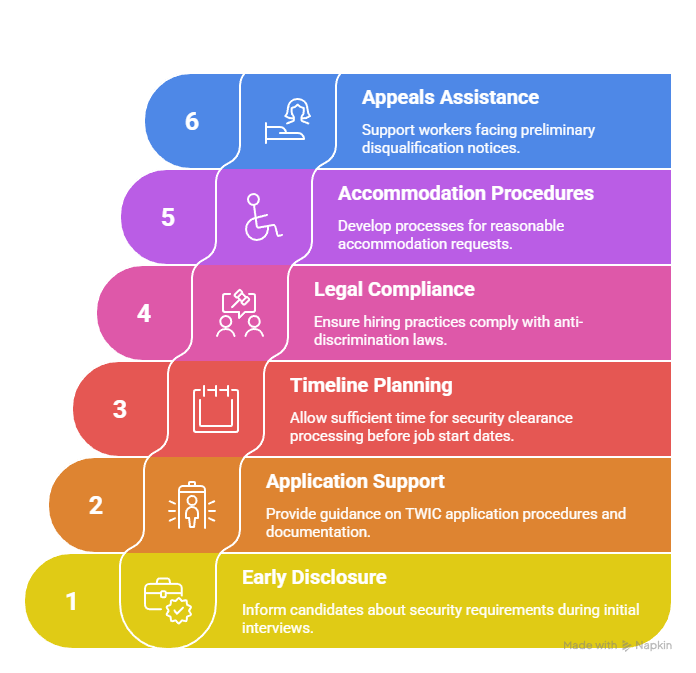TSA maritime security requirements establish comprehensive background check protocols and security clearances for port workers under the Transportation Worker Identification Credential (TWIC) program. These federal regulations ensure maritime facilities maintain proper security standards while protecting critical infrastructure from potential threats.
Key Takeaways
- Port workers must obtain a TWIC card through TSA's background check process to access secure maritime facilities and vessels.
- The maritime worker clearance process includes fingerprinting, criminal history review, and immigration status verification.
- Background checks examine 7-10 years of criminal history, including disqualifying offenses like terrorism, espionage, and certain felonies.
- TWIC cards are valid for five years and require renewal with updated background screening before expiration.
- Employers at maritime facilities must verify worker credentials and maintain compliance with port security regulations.
- Appeals processes exist for workers who receive preliminary disqualification notices from TSA's security threat assessment.
Understanding TSA Maritime Security Framework
The Transportation Security Administration (TSA) oversees maritime security through the Maritime Transportation Security Act (MTSA). This comprehensive legislation mandates strict port security regulations for workers accessing restricted areas. The system protects America's waterways, ports, and maritime infrastructure from security threats.
TSA maritime security requirements apply to various worker categories. These include longshoremen, truckers, maritime crew members, and facility maintenance staff. The program covers over 3.2 million workers nationwide who need regular access to secure port areas. Additionally, these regulations complement international maritime security standards. They also address specific domestic security concerns related to port operations.
The framework requires coordination between multiple parties. Federal agencies work with port authorities and private employers to maintain security. This collaboration ensures consistent security standards across all maritime facilities. Moreover, the system adapts to changing threat levels and security challenges.
Legal Authority and Compliance Standards
The Maritime Transportation Security Act of 2002 provides TSA with authority to establish port worker requirements. Federal regulations under 49 CFR Part 1572 detail specific procedures for maritime worker clearance processes. These rules create binding obligations for both workers and employers.
Maritime facilities must comply with these standards to maintain their operational permits. Furthermore, non-compliance can result in significant penalties and facility closures. Port authorities regularly audit compliance to ensure ongoing adherence to security protocols.
TWIC Card Requirements and Application Process
Transportation Worker Identification Credential (TWIC) cards serve as the primary security clearance for maritime workers. Workers need these cards to access restricted port areas and board vessels. The application process requires in-person enrollment at TSA-approved centers.
During enrollment, applicants complete biometric data collection and submit required documentation. Processing typically takes 4-6 weeks from submission to card delivery. However, expedited services may be available in certain circumstances. The system prioritizes applications based on employer needs and operational requirements.
| Application Component | Requirement | Processing Time |
| Background Check | FBI name-based and fingerprint screening | 3-5 business days |
| Document Verification | Citizenship/immigration status review | 1-2 business days |
| Biometric Enrollment | Fingerprints and photograph collection | Same day |
The TWIC application requires specific identification documents. Valid options include U.S. passports, driver's licenses, or acceptable combinations of primary and secondary identification. Additionally, applicants must provide documentation of legal name changes and immigration status.
Required Documentation and Fees
Applicants must bring original or certified copies of identification documents to their enrollment appointment. Birth certificates, naturalization papers, and immigration documents serve as acceptable proof of citizenship or legal status. The TSA enrollment center staff verify all documents during the appointment.
The current TWIC fee structure includes $125.25 for new applications. Renewal applications cost $117.25, providing modest savings for existing cardholders. Payment methods include credit cards, money orders, and certified checks at most enrollment locations.
Enrollment Centers and Scheduling
TSA operates over 380 TWIC enrollment centers nationwide. These locations include permanent facilities and mobile units that serve smaller ports. Mobile units visit remote locations on scheduled rotations to ensure accessibility.
Applicants must schedule appointments online through the official TSA enrollment portal. Phone scheduling is also available for those without internet access. Walk-in appointments may be available at select locations, though scheduled appointments receive priority processing.
Background Check Process and Disqualifying Factors
TSA's security threat assessment examines multiple aspects of an applicant's history. The process includes criminal background checks, immigration status verification, and terrorist database searches. Additionally, the system checks for connections to prohibited organizations or activities.
The maritime worker clearance process evaluates both permanent and interim disqualifying factors. These factors determine whether an applicant can receive a TWIC card immediately. Some disqualifications are permanent, while others have time-based limitations.
Permanent Disqualifying Offenses:

- Espionage: Any conviction for espionage or conspiracy to commit espionage against the United States. This includes sharing classified information with foreign governments or hostile entities. Such convictions result in lifetime disqualification from maritime security credentials.
- Sedition: Convictions for sedition or conspiracy to commit sedition create permanent barriers to TWIC eligibility. These offenses involve attempts to overthrow or undermine the U.S. government through force or violence. The disqualification applies regardless of when the conviction occurred.
- Terrorism: Any terrorism-related conviction or support for terrorist organizations results in permanent disqualification. This includes material support, financing, or participation in terrorist activities. The broad definition encompasses various forms of terrorist involvement.
- Aircraft Piracy: Convictions for aircraft hijacking or conspiracy to commit aircraft piracy permanently disqualify applicants. These offenses demonstrate a pattern of transportation security violations. The disqualification extends to maritime security due to similar threat profiles.
- Property Destruction: Willful destruction of property used in interstate commerce creates permanent disqualification when related to terrorism. This includes attacks on transportation infrastructure, communication systems, or energy facilities. The intent to disrupt commerce must be proven for this disqualification to apply.
Interim Disqualifying Offenses (7-year lookback period):
- Weapons and Explosives: Unlawful possession, use, sale, or distribution of explosives or firearms creates a seven-year disqualification period. This includes violations of federal firearms laws and explosive device regulations. The timeframe begins from the conviction date or release from incarceration, whichever is later.
- Financial Crimes: Extortion, dishonesty, fraud, or misrepresentation convictions result in interim disqualification. These offenses demonstrate character issues that concern maritime security officials. The seven-year period applies to all forms of fraud, including identity theft and financial institution fraud.
TSA may grant waivers for certain interim disqualifying factors under specific circumstances. The waiver process requires additional documentation and character references. However, waiver approval extends processing time significantly and has no guarantee of success.
Appeals and Waiver Processes
Workers who receive preliminary disqualification notices have appeal rights. The appeals process must be initiated within 60 days of receiving the notice. Late appeals face automatic rejection unless extraordinary circumstances exist.
Applicants can provide additional documentation during appeals. Character references, evidence of rehabilitation, and legal documents support appeal cases. The administrative hearing process allows applicants to present their case to TSA officials.
Employer Responsibilities Under Port Security Regulations
Maritime facility operators must verify worker credentials before granting access to secure areas. This responsibility extends to all personnel requiring facility access, including contractors and temporary workers. Port security regulations create specific verification requirements that employers must follow consistently.
Employers must implement electronic card reader systems that verify TWIC authenticity. These systems check cards against TSA's canceled card list in real-time. Additionally, visual inspection procedures ensure cards match the cardholders and remain within validity periods.

- Authentication Systems: TSA-approved card readers verify electronic security features
- Visual Verification: Security personnel check photos, expiration dates, and physical card integrity
- Access Documentation: Detailed logs record all facility access and verification activities
- Training Requirements: Security staff receive ongoing education about verification procedures
- Compliance Audits: Regular reviews ensure continued adherence to security protocols
Staffing agencies face unique challenges when placing workers at maritime facilities. These organizations must understand TSA maritime security requirements while complying with employment laws. Proper planning prevents delays and ensures successful worker placement at client facilities.
Facility Security Officer Duties
Each maritime facility must designate a Facility Security Officer (FSO) responsible for security implementation. FSOs coordinate with TSA officials, Coast Guard personnel, and other security agencies. These positions require specialized training and federal approval before assuming duties.
The FSO oversees daily security operations including TWIC verification procedures. They also manage security incident reporting and coordinate emergency response activities. Regular communication with federal agencies ensures ongoing compliance and threat awareness.
Record Maintenance and Compliance Documentation
Maritime employers must maintain detailed access control records for federal inspection. These records include verification logs, incident reports, and training documentation. The retention period varies by document type but typically spans several years.
Electronic systems facilitate record-keeping and provide searchable databases for compliance reviews. However, backup procedures ensure continuity when technology fails. Regular audits verify that record-keeping practices meet federal requirements.
Renewal Requirements and Maintenance
TWIC cards expire every five years and require renewal before the expiration date. The renewal process includes updated background checks and biometric verification. Workers should begin renewal procedures 8-10 weeks before expiration to ensure continuous facility access.
Renewal applications may qualify for streamlined processing under certain conditions. Applicants with continuous maritime employment and clean criminal records often receive expedited handling. However, TSA reserves the right to require full re-enrollment based on security concerns.
| Renewal Scenario | Required Documentation | Processing Timeline | Special Considerations |
| Standard Renewal | Current TWIC, valid ID | 4-6 weeks | No criminal incidents since last renewal |
| Name Change | Marriage certificate, court order | 6-8 weeks | Additional identity verification required |
| Lost Card Replacement | Police report, identification | 4-6 weeks | Fee applies for replacement card |
Card holders must report certain incidents to TSA during the validity period. These include arrests, criminal charges, and immigration status changes. Failure to report disqualifying events can result in card revocation and criminal penalties.
The reporting obligation continues throughout the five-year validity period. Workers must submit notifications within specified timeframes after incidents occur. Late reporting may result in additional penalties beyond card revocation.
Continuous Vetting and Monitoring
TSA conducts ongoing monitoring of TWIC cardholders through various databases. This continuous vetting identifies new criminal activity or security concerns. The system automatically flags cardholders who acquire disqualifying offenses after card issuance.
Employers may receive notifications about worker status changes that affect their security clearance. These alerts help facilities maintain security while protecting worker privacy rights. The balance between security and privacy requires careful handling of sensitive information.
Special Considerations for Hiring and Staffing
Staffing agencies placing workers at maritime facilities face complex regulatory requirements. These organizations must balance TSA maritime security requirements with employment law obligations. The intersection of security needs and fair hiring practices requires careful navigation.
Pre-employment screening should inform candidates about TWIC requirements early in the process. This transparency prevents wasted resources on candidates who cannot obtain security clearances. However, employers must avoid discriminatory assumptions about eligibility based on protected characteristics.

- Early Disclosure: Inform candidates about security requirements during initial interviews
- Application Support: Provide guidance on TWIC application procedures and documentation
- Timeline Planning: Allow sufficient time for security clearance processing before job start dates
- Legal Compliance: Ensure hiring practices comply with anti-discrimination laws
- Accommodation Procedures: Develop processes for reasonable accommodation requests
- Appeals Assistance: Support workers facing preliminary disqualification notices
The Americans with Disabilities Act (ADA) applies to maritime hiring despite security requirements. Employers must engage in interactive processes for reasonable accommodations while maintaining security standards. Documentation requirements and appeals processes provide mechanisms for addressing individual circumstances.
State fair employment laws also apply to maritime industry hiring. These laws may provide additional protections beyond federal requirements. Employers should consult legal counsel when state and federal requirements create conflicting obligations.
Best Practices for Employment Compliance
Maritime employers should develop comprehensive policies addressing TWIC requirements and employment law compliance. These policies should cover reasonable accommodations, appeals support, and anti-discrimination measures. Regular training for hiring managers ensures consistent policy application.
Legal counsel specializing in employment law can provide guidance on complex security clearance issues. This expertise helps navigate situations involving disability accommodations, criminal history considerations, and appeal processes. Professional guidance reduces legal risks while supporting worker rights.
Industry Impact and Economic Considerations
TSA maritime security requirements significantly impact port operations and employment patterns. The program affects hiring timelines, workforce planning, and operational costs for maritime employers. Understanding these impacts helps businesses develop effective strategies for regulatory compliance.
The economic impact extends beyond direct costs to include productivity effects and competitive considerations. Facilities with efficient security processes gain operational advantages over those struggling with compliance. Additionally, security incidents can result in costly shutdowns and federal penalties.
Cost Factors for Maritime Employers:
- Equipment Investment: Card reader systems and maintenance contracts require significant capital expenditure. These systems need regular updates to maintain compatibility with TSA security standards. Additionally, backup systems ensure continuity when primary equipment fails.
- Training Expenses: Security personnel require initial and ongoing training to properly verify TWIC cards. This training includes both classroom instruction and hands-on practice with verification equipment. Regular refresher training ensures skills remain current with changing procedures.
- Administrative Overhead: Compliance documentation and record-keeping create ongoing administrative costs. These activities require dedicated personnel and systems to manage effectively. The complexity of federal requirements often necessitates specialized compliance staff.
- Delayed Operations: Security processing can slow facility operations and increase turnaround times. These delays affect vessel schedules and cargo handling efficiency. However, streamlined security procedures can minimize operational impact.
The maritime industry has adapted to security requirements through technological improvements and procedural refinements. Modern card readers process verifications quickly and integrate with facility access systems. These improvements reduce operational friction while maintaining security effectiveness.
Technology Integration and Future Developments
Emerging technologies promise to further streamline maritime security processes. Biometric systems, artificial intelligence, and blockchain technology offer potential improvements to current procedures. However, implementation requires careful coordination with existing TSA requirements.
Mobile verification systems allow security checks at multiple facility locations. These portable units provide flexibility for large facilities with multiple access points. Additionally, real-time database connectivity ensures immediate verification of card status and validity.
Conclusion
TSA maritime security requirements create a comprehensive framework protecting America's ports through rigorous worker screening. The TWIC program balances national security needs with employment opportunities while providing clear procedures for compliance. Understanding these requirements helps employers, staffing agencies, and workers navigate complex regulatory obligations successfully. Proper compliance protects individual careers and national security interests while maintaining fair hiring practices. As maritime commerce continues growing, these security measures remain essential for protecting critical infrastructure and maintaining public confidence in port security.
Frequently Asked Questions
How long does it take to get a TWIC card?
The TWIC application process typically takes 4-6 weeks from enrollment to card delivery, though processing times may vary based on background check complexity and current application volumes.
What disqualifies someone from getting a TWIC card?
Permanent disqualifications include terrorism-related convictions, espionage, and sedition, while interim disqualifications cover various felonies and misdemeanors within 7-10 years depending on the offense type.
Can employers require TWIC cards for all maritime jobs?
Employers can only require TWIC cards for positions requiring access to secure areas of maritime facilities, not for all maritime-related employment positions.
How much does a TWIC card cost?
New TWIC applications cost $125.25, while renewal applications are $117.25, with fees subject to periodic adjustments by TSA.
What happens if my TWIC application is denied?
Applicants can appeal denial decisions within 60 days, request administrative hearings, and potentially apply for waivers depending on the disqualifying factors involved.
Do TWIC cards work at all U.S. ports?
Yes, TWIC cards are valid at all maritime facilities covered by TSA regulations nationwide, providing standardized access credentials across the maritime industry.
Additional Resources
- Official TSA TWIC Program Information
https://www.tsa.gov/for-industry/twic - Maritime Transportation Security Act Full Text
https://www.congress.gov/bill/107th-congress/house-bill/3507 - Code of Federal Regulations Title 49 Part 1572
https://www.ecfr.gov/current/title-49/subtitle-B/chapter-XII/subchapter-A/part-1572 - Coast Guard Maritime Security Regulations
https://www.dco.uscg.mil/Our-Organization/Assistant-Commandant-for-Prevention-Policy-CG-5P/Inspections-Compliance-CG-5PC-/Office-of-Port-Facility-Compliance/ - Employment Law Considerations for Security Clearances
https://www.eeoc.gov/laws/guidance/background-checks-what-employers-need-know - TWIC Reader Requirements and Technology
https://www.tsa.gov/for-industry/twic/twic-readers

GCheck Editorial Team
Meet the GCheck Editorial Team, your trusted source for insightful and up-to-date information in the world of employment background checks. Committed to delivering the latest trends, best practices, and industry insights, our team is dedicated to keeping you informed.
With a passion for ensuring accuracy, compliance, and efficiency in background screening, we are your go-to experts in the field. Stay tuned for our comprehensive articles, guides, and analysis, designed to empower businesses and individuals with the knowledge they need to make informed decisions.
At GCheck, we're here to guide you through the complexities of background checks, every step of the way.





